Peter MALONE
Saturday, 18 September 2021 19:48
Challenge to Lassie
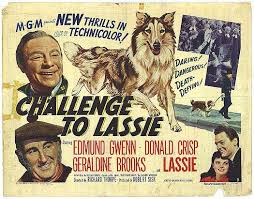
CHALLENGE TO LASSIE
US, 1949, 85 minutes, Colour.
Edmund Gwenn, Donald Crisp, Geraldine Brooks, Reginald Owen, Alan Napier, Henry Stephenson, .
Directed by Richard Thorpe.
Challenge to Lassie is one of several films made in the later part of the 1940s, capitalising on the popularity of Lassie. Lassie appeared first of all in Lassie Come Home in 1943, directed by Fred Wilcox. It was a star vehicle for Elizabeth Taylor and Roddy Mc Dowall as well as for introducing the popular collie, Lassie.
Capitalising on wartime themes, Lassie appeared in Son of Lassie with Peter Lawford as well as The Courage of Lassie. There were other popular films like The Sun Comes Up with Jeanette Mc Donald and The Hills of Home with Janet Leigh and Tom Drake.
There were later television series and several films starring Lassie.
This film might have been called Greyfriars Lassie because it is based on the popular novel, Greyfriars Bobby. It tells the story of the faithful dog found as a pup by a shepherd, Donald Crisp, who looks after it and the dog forms an attachment. Edmund Gwenn is the innkeeper who befriends the dog and defence it in court when it is considered a stray and therefore no one could pay the owner’s licence fee because there is no owner. The consequence is that the dog is to be destroyed after three days.
In the meantime, when the old man dies and is buried in Greyfriars Cemetery, Lassie goes every day to stay at the grave. This disturbs Mr Brown, the keeper of the cemetery, but he relents and is helped by his daughter, Geraldine Brooks, to protect the dog. The two veteran actors, both Oscar winners for Best Supporting Actor, and joined by a great number of character actors from the 1930s, most sporting Scots accents.
The recreation of Edinburgh is certainly studio bound but there are colourful outdoor scenes. The film was directed by Richard Thorpe, who worked at MGM for several decades, directing all kinds of films, especially action films and costume dramas.
1. The appeal of Lassie, in the 1940s, the many films, the later television series and films, perennially popular?
2. The Greyfriars Bobby story and its adaptation for Lassie? The city of Edinburgh, the studio sets? The outdoor countryside and its beauty? The human story, the old man, the dog, the bond between them, the dog keeping vigil, the police and the opposition, the laws of Edinburgh to destroy stray dogs, the children’s support, Mr Trail and his appearance in court?
3. The shepherd, reminiscing about his work, finding the dog, seeing its breeding, wanting the man to mind the dog, his change of heart, the discussions with Mr Trail? Going back home, the return to the city, his intention of branching out on his own? The thugs and their beating him? His death? His burial? Lassie continually at the grave?
4. Mr Brown, not wanting the dog in the cemetery, his daughter being kindly, her attraction to Mr Trail’s son? The offer of the reward? Mr Brown bringing the dog to Mr Trail? The later agreement for the dog to be in the cemetery? The Sunday service, the Dominie and his going for a walk, in the cemetery, knowing the dog was in the box, his benign attitude towards the discussions about its fate? And his appearance in the court? The children coming and playing with Lassie? The children collecting the money to buy the licence?
5. Mr Davie, the stern policeman, no humour, his taking Lassie in, the discussions with the police and the law? Lassie escaping, going with the military and the parade, the soldiers liking him? Liking her? The bugle, Lassie going down the side of the mountain, returning to the cemetery?
6. The protest, the guest from London, their being impressed by Lassie? In the court, the rigidity of the law, the promise trying to explain it to the children? The children’s reactions? Mr Trail and his appeal? Mr Brown, the Dominie? Mr Trail’s son trying to find some regulation?
7. Lassie in court, the solution with giving Lassie the keys of the city, the Freedom? And the irony of Mr Davie having to answer the questions of passers-by at the cemetery?
8. The appeal to children and to adults of this kind of story?
Published in Movie Reviews
Published in
Movie Reviews
Tagged under
Saturday, 18 September 2021 19:48
Falcon in Hollywood, The
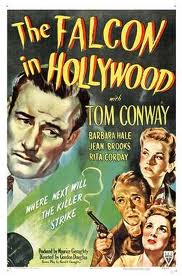
THE FALCON IN HOLLYWOOD
US,67 minutes, 1944, Black and white.
Tom Conway, Barbara Hale, Veda Ann Borg, John Abbott.
Directed by Gordon Douglas.
With The Falcon in Hollywood, Tom Conway took possession of the role of the Falcon, previously held by his own brother, George Sanders. They appeared together in The Falcon’s Brother in which the Sanders character is killed, giving his life for a foreign diplomat. Since Tom Conway had appeared as the brother in this film, he was able to step into the shoes of Sanders and make nine Falcon films.
This one is a bit better than the usual, perhaps better written, and also having Gordon Douglas as the director, a director who was to go on to make many standard films but who emerged in the 1960s and 70s with bigger budget thrillers.
There is a murder in the studios in Hollywood during the making of a film. It is interesting to see the Hollywood atmosphere of the times, the guards of the studio being particularly stern in administration of entries, but The Falcon being able to slip in where he wishes. He has been at the races and has encountered a film star who believes in numerology – and whose choice wins the race. While at the races he is met by an East Coast gambler (Sheldon Leonard) as well as his girlfriend (Barbara Hale). When the girlfriend takes the bag of the film star, the star urges the Falcon to recover it for her. He follows her to the studio where the leading man is found murdered.
Quite a lot of suspects are possible, including the film star who resents not being cast in this film, the gangster himself who turns up at the studio, his girlfriend who has a leading part in the film because of the gambler’s investment in it, as well as the costume designer who is associated with the dead actor, the temperamental director of the film who is in love with the costume designer. They are all being rounded up at various times by the local police.
Important to the mood of the film is the taxi driver played by the Veda Ann Borg, a cheery role, plenty of comedy, coming in at the wrong times, driving at high speed, but nevertheless helping the Falcon with his work. She is the kind of sidekick who appeared, always men, in the Saint films as well as the Falcon films.
There is also the film director who is anxious about his film being held up. When all seems to be settled, the leading lady fires a gun and the director is shot.
The main point of the conspiracy to murder is similar to that which Mel Brooks took up in The Produces, sabotaging a production so that it would get go bankrupt and the producer would not have to pay the investors. This means that the Shakespeare-quoting producer is the villain despite his protests about the delays to his film.
This was the kind of interesting crime drama which made for solid supporting features in the 1940s.
Published in Movie Reviews
Published in
Movie Reviews
Tagged under
Saturday, 18 September 2021 19:48
Christmas in Connecticut/ 1992
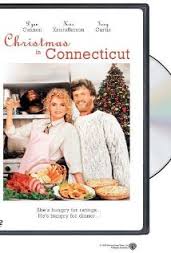
CHRISTMAS IN CONNECTICUT
US, 1992, 100 minutes, Colour.
Dyan Cannon, Kris Kristofferson, Tony Curtis, Richard Roundtree.
Directed by Arnold Schwarzenegger.
If the audience was asked to guess which action director made this comic farce, probably no one would suggest Arnold Schwarzenegger. But he did. (And there is a Terminator joke when the young boy looking like the Terminator says ‘I’ll be back’; Schwarzenegger directed this film at the time he was making Terminator two and Kindergarten Cop.)
This is a remake of the 1940s comedy of the same name with Barbara Stanwyck. It is certainly updated into the late 20th century television era.
Dyan Cannon, in sprightly and romantic comic vein, is a top television cook. And then we see that she knows very little about cooking and it is all done by her staff who are able to put it on the set surreptitiously to enhance her reputation. Her producer is played by an over-ventilating Tony Curtis. By contrast, Kris Kristofferson plays the outdoor type, becoming a national figure in his rescuing of a young boy trapped in a mountain fire. The complication of the plot is that the producer organises a Christmas show where Dyan Cannon will cook a meal for Kris Kristofferson – whose house burned down while he is away and one of the only things found was one of her cookbooks.
Most of the comedy is in the preparation for the TV show, the setting up of the fake family, their own personal crises and interactions, the over-zealous work of the producer who wants to appear as the cook’s husband. In the meantime, the guest arrives early and is attracted towards the cook.
The climax of the comedy is in the mayhem of the actual production where so many things go wrong, where the head of the network, Richard Roundtree, turns up and the director becomes exasperated by everything. And everything includes the cook confessing all on-screen. But the programs ratings go through the roof – but the cook and the outdoor man find love and she will go and rebuild his house with him.
A light-hearted broad comedy and farce for Christmas celebrations.
1. The original film in the 1940s, adapted to the 1990s into the television age?
2. The television studio settings, the details of the cooking programs, the assistance during the cooking, the presentation on screen, audiences and enjoying cooking shows? The prospect of the Christmas special with the star cook and the hero of the hour?
3. The Connecticut setting, the house, the contrast with Elizabeth’s apartment in New York City, the winter, the snow?
4. Jefferson Jones and his home, being called out, his rescue of the boy lost for so many hours, the television coverage, his becoming a national celebrity? And his house burning down? In the debris, finding the toothbrush, and Elizabeth’s cookbook? The invitation to do the program, his accepting it to get the money to rebuild his house? His being invited early by Alex and his arriving early?
5. Elisabeth, single, not domesticated at all, program, her home, buying the knickknacks, costly? Her elegant home and furnishings, the hamburger meal? The proposal about the program? And not wanting to do it?
6. Assembling the fake family, the couple with the baby and handling the baby on and off screen, Anthony becoming Kevin, his being absolutely obnoxious, wanting the money, eating, clashing with Alex, kicking him? And his vomiting behind the Christmas tree?
7. Josie, the faithful friend, the skillet cooking, her husband, his job handing out leaflets, his preparing for the audition, not wanting to come and be the son-in-law? His being persuaded? His preparation for his part, the serial killer, talk of vampires? Alex and his being upset, seeing him with the baby and threatening lines? Josie in the van and the crash?
8. Jefferson Jones and his coming to terms with the group, believing everything, attracted to Elizabeth, going out for the walk with Alex and Alex’s attempt to explain everything plausibly? Going out with Elizabeth to shoot the goose, her dread? His giving her advice about her marriage, yet kissing her? Going out in the coach, being taken by the police?
9. The owner of the network, his arrival, being caught up in the mayhem? Firing everyone?
10. The taping of the show, the director and his growing exasperation, being mystified, the continuity girl and her inability to help? Sally missing? Alex coming on as a husband and freezing, unable to perform?
11. Elizabeth, handling the situation, moving from room to room, the goose in the oven, not cooked, the continued problems? Mixing the flapjack material after her surprise success in flinging it?
12. The decision to tell the truth, after explaining all the family, then saying who they all were, the fact that she could not cook, her comments to Jefferson, his bewilderment?
13. Alex and his trying to help the cause, failing? Elizabeth and her being free and happy? Getting the baby back, explaining who the couple were, the husband and his audition to camera, and Jefferson glad that she was not married?
14. The visit of the owner and Alex, the high ratings, wanting further programs? Elizabeth refusing, going to Colorado to rebuild his house with Jefferson?
Published in Movie Reviews
Published in
Movie Reviews
Tagged under
Saturday, 18 September 2021 19:48
Johnny Mnemonic
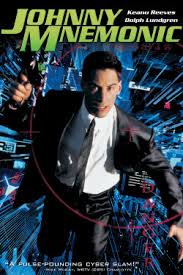
JOHNNY MNEMONIC
US, 1995, 95 minutes, Colour.
Keanu Reeves, Dina Meyer, Takeshi, !ce T, Dolph Lundgren.
Directed by Robert Longo.
We are taken into a grim future where people can be turned into computer communicators with Keanu Reeves as cyberspace hero, William Gibson's Johnny.
Of interest for film buffs, there is an appearance by Dolph Lundgren as a crazy Street Preacher, and of celebrated Japanese director, Takeshi Kitano, as a Yakuza head.
While there are science-fable warnings about technology versus the human, it is all rather violent – perhaps that is the point. But some of the violence seems to relish the brutal touches and Keanu Reeves is a dull lead. Brutal cyberspace prophecies.
1. A film version of William Gibson’s short story? The screenplay by Gibson himself? Some fans not liking the film because of the adaptation, despite Gibson writing it?
2. William Gibson’s science fiction, in the 1980s and 1990s? Futuristic? This setting in 2021? The Internet world, the couriers with implant messages, big business and self-protection, the Yakuza?
3. The photography, arty style, the credits, the visuals of the world, in China, in the US? An Internet and Virtual reality? Costumes and decor? The musical score?
4. The situation, the information given at the beginning, the nature of the world, the disease, humans succumbing, and Internet linking? The role of big business? a cure for the disease? Concealing it and making money? The hidden revolutionaries?
5. Johnny, in himself, having no memories, a courier, submitting to the implants? His style, clothes, wanting the high life? Asked to make sacrifices?
6. The Chinese rebels, Johnny going to the apartment, his agreement about the implant? The dangers? His flight to Newark? The connection with Ralfi, visual communication with him? His being met at Newark?
7. The contact with Spider, Spider and his connections, recommendations, his death? The meeting with Jane, her connections, personality, support of Johnny, the bond between them? Sharing in his adventures?
8. Yakuza connections, the boss, the Japanese atmosphere, sinister, his wanting the cure, desperate, his child? His arrival in Newark, the confrontation, his not being with the company, the violence, his death?
9. The rebels, the leader, the guards, the comic touches, security, the falling vehicles and fire? Johnny and Jane being received? Suspicions? The infiltrations into Pharmacon, and its agents?
10. The bizarre Street Preacher? Look and clothing? Sense of mission? Religious? Mania? The attacks on Johnny, his death?
11. Johnny and the decoding, his beginning to have memories, the extreme pain, holding on, ready to sacrifice himself?
12. The group getting the information about the cure, some hope for the world? And Johnny and Jane?
13. Audience response to this kind of futuristic scenario? The film and its influence on futuristic films which were to follow?
Published in Movie Reviews
Published in
Movie Reviews
Tagged under
Saturday, 18 September 2021 19:48
Backyard Ashes
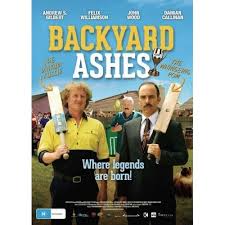
BACKYARD ASHES
Australia, 2013, 90 minutes, Colour.
Andrew S.Gilbert, Felix Williamson, Lex Marinos, Rebecca Massey, John Wood.
Directed by Mark Grentell.
So this is what life in the city of Wagga is like!
This is a small independent film which, unfortunately, had a very limited release. Audiences would enjoy it very much. It is not often that one sees a city council investing in a film but this is what the city of Wagga Wagga has done, and playing with words, it is a Crow Crow production!
The title tells all, or mostly all. A group of men who work in a local factory enjoy playing backyard cricket, especially in the house of Doug Waters (Andrew S. Gilbert). His friends are all rather Ocker types, pleasingly so, with a capacity for some droll one-liners. They include a friend with Japanese origins, and another with Indian origins and his wife. And not to leave anyone out, there is a Kiwi with a very prominent accent and pronunciation a real target as always.
Then there are retrenchments at the factory, one of the cricketers going off with his wife to find work in Broken Hill. And who should buy his house but the very Pommy official who did the sacking? Doug and family can’t believe that Mr Edward Lords is there next-door neighbour. He is come with his wife and, especially his cat, who plays a significant role in the high drama of neighbourliness and grudge matches – and provides ashes. In fact, Mr Lords is particularly British, pomposity personified, prefers to keep to himself, has no sense of humour, and when goaded into the backyard Ashes, finds that he has an intense drive to win.
Most audiences would enjoy the talk amongst the friends, the barbecues in the backyard, the cricket practice, even for Doug’s young daughter. Meanwhile his wife and Mrs Lords become good friends.
When a feline tragedy ensues, what else can rivals do to compensate and make peace but organise a cricket match, local Ashes?
By the time the match actually comes round, the audience will have been chuckling most of the time, at the recognisable characters, at their interactions, at the local dialogue. This means that by the time of the match itself, we are ready to chuckle all the way through and the match provides plenty of opportunity with its rules, the boasting of one of the players, Spock, who also does a cricket commentary parodying Richie Benaud. Mr Lord’s has found a British team – and the screenplay enjoys itself mocking Pommy manners, Pommy attitudes, Pommy b…
2012 saw another cricket film, Save Your Legs, about a Melbourne team which toured India. It was enjoyable but Backyard Ashes should prove itself even more entertaining, taking cricket seriously, but not taking ourselves seriously.
1. Australia and its love the cricket? The UK? Rivalry?
2. Comedy, serious, competition? The audience and knowledge of the ashes? Ashes?
3. A Wagga Wagga film? Country New South Wales, country Australia, the overview of the city, the streets, homes, factory? Low-budget, limited sets? The musical score?
4. The Australian flavour, mateship, family life, people sticking together, drinking, playing cricket, yarning? The ethnic element with Japanese and Indian origin people? Characters?
5. Introduction to the characters, Doug, the central character, his wife, the children, his daughter playing cricket, his son with the camera? Spock, brash and loud, hiding his New Zealand girlfriend? The New Zealand friend, Toby, accent, people ribbing him all the time? The old man, enjoying cricket, retrenched, selling his house, going with his wife to Broken Hill? The Japanese man? The Indian man and his wife? The jokes about bad language? All of the backyard, forming a community?
6. The factory, the community of the workers, playing cricket in their spare time?
7. Edward Lords, his arrival, pompous, meeting the men, his retrenching the men instantly? No compunction?
8. The irony of the sale of the house, Lord’s buying the house, his wife, his precious cat? Snob, solitary? His wife genial, making friends with Doug’s wife? In an out of the house?
9. The barbecues in the yard, the cat – and the barbecue? The Ashes?
10. The reaction, the decision to have the cricket match with the cat’s Ashes? Lords and his accepting? His team and their very British manner and style?
11. Everybody practising for the match, Doug with his daughter?
12. The build-up to the match, sense of anticipation, rivalry?
13. The match, the teams, the Brits and their problems, the rules and scoring, the dismissals? The comedy and cricket-knowledgeable audiences enjoying
the play? Comedy intentions? The build-up to the score and the win? Doug’s daughter and her role? At the end everybody good sports, shaking hands, a drink together, talk, suggesting that Lords lighten up, the effect of cricket and reconciliation?
14. The new cat and the enjoyably joking ending? A genial film for general entertainment?
Published in Movie Reviews
Published in
Movie Reviews
Tagged under
Saturday, 18 September 2021 19:48
Deadfall/ 2011
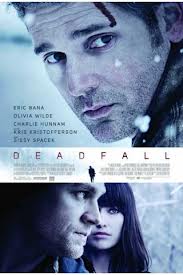
DEADFALL
US, 2011, 95 minutes, Colour.
Eric Bana, Olivia Wilde, Charlie Hunham, Sissy Spacek, Kris Kristofferson, Kate Mara, Treatt Williams.
Directed by Stefan Ruzowitsky.
Deadfall is a thriller set on the American- Canadian border. We are introduced to a brother and sister, Addison and Liza (Eric Bana and Olivia Wilde). They have robbed a bank and are moving towards Canada when their driver has an accident and they are forced to part and move towards the border each in their own way. Addison’s way is one of violence, many murders,being surrounded in an old farmhouse, eventually getting out, a confrontation with a family and with Liza.
In the meantime, we are also introduced to a young boxer, getting out of prison for taking the fall, going to his manager to get his money, a fight and his thinking he had killed the manager. It is he who picks up Liza, travelling together, falling in love. He is on his way home for Thanksgiving dinner with his parents, Sissy Spacek and Kris Kristofferson. Also in the picture is a young FBI Deputy, in love with Jay (Kate Mara) and her brutish sheriff father, Treat Williams.
There are some questions and improbabilities in the relationship between Addison and Liza, especially at the end when she opts for Jay rather than Addison.
In many ways a ‘take it or leave it’ thriller, directed by Austrian director, Stefan Ruzowitsky who directed The Inheritors as well as the excellent drama, Counterfeiter.
1. The title, animal trap? The experience of the criminals, the innocents, the ending?
2. The American- Canadian border, Winter, the snowscapes, the highway, blockages, homes, isolation, the lakes, the snow, the storms? The musical score?
3. Addison and Liza, Theo, the casino, the robbery, the escape? Theo and the deer, the crash, the car destroyed? The patrolman, murdered? Addison as a murderer, violence? Dividing the money, his escape, the blood trail? Liza and her character, relationship with Addison, love, dependence, hitching a ride?
4. The introduction to Addison and Liza, grim, relationship, planning the rendezvous? Violence and no scruples?
5. Jay, in prison, serving his time, the past crime, pulling the fight, the phone calls, talking to his mother, planning to be home for Thanksgiving?
6. Jay meeting the manager, the quarrel, the money issue, the fraud, Jay hitting the manager, thinking him dead?
7. Jay, the encounter with Liza, talking, neither telling the truth? Giving her a lift? The dangerous driving, moving to the Canadian border, the relationship, love? The phone call and her talking with Addison? Explaining her situation?
8. June, her character, as a mother, relationship with Chet, his going hunting, his reaction to his son, stern?
9. Hanna, FBI Deputy, the strong character, wanting to go on the hunt for the criminals, relationship with her father, his being difficult, not wanting her to go? The visit to June, the friendship? With Jay? Her father not allowing her to go in pursuit of the criminals?
10. Jay arriving home, reunited with his mother, the attitude of his father? Hanna and her visit? Introducing Liza? being at home in the family?
11. Addison, his wound, killing people on the way who stood in his path, his violence, with the police, the build-up to his time in the barn, with the owner, the shootout? Confrontation with Liza? His death?
12. June, her reaction to the situation, Addison, her resorting to the gun?
13. The truth about Liza and Addison, Jay and his reaction, with Liza? The future?
Published in Movie Reviews
Published in
Movie Reviews
Tagged under
Saturday, 18 September 2021 19:48
Phoenix/ 1998
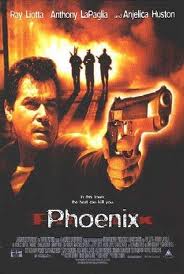
PHOENIX
US, 1998, 100 minutes, Colour.
Ray Liotta, Anthony la Paglia, Jeremy Piven, Daniel Baldwin, Anjelica Huston, Brittany Murphy, Xander Berkely. Giancarlo Esposito, Tom Noonan.
Directed by Danny Cannon.
Phoenix is a police drama, set in the city which is in the middle of a desert, hot and, as the film suggests, airless. The group of police that we see, bonding like Four Musketeers, is corrupt. They don’t take their work to seriously, play pranks on the other members of the force, are in contact with a loan shark, and finally decide to rob him. Which also leads to several killings.
The central focus is on Ray Liotta as Harry, alone, and addicted gambler, in debt to an agent, Chicago, played by Tom Noonan. However, he never welshes on payment and is driven to desperation to ask his friends to rob the loan shark. This gets out of hand and further corruption is revealed.
The film was produced by Ray Liotta, and his central role is a typical Liotta performance. Anthony La Paglia is his cynical friend. Other members of the group Daniel Baldwin and Jeremy Piven. There is an interesting performance by Angelica Huston as a world-weary server in a bar. Brittany Murphy is her daughter.
1. The title, the place, the overview of the cityscape, the state of mind, heat, the air, the desert?
2. The city and its police force, crime, clubs, homes, crime scenes, the musical score?
3. Harry, his arrival of the warehouse, blood and the wound, burning the dollar note? The transition to Mike and his friends, the flashbacks?
4. The credibility the credits, the for musketeers, friends, colleagues, antagonisms, their work together, on crime scenes and the different roles?
5. Harry as the centre, the crime scene of the mother with the gun to her husband, his abuse of her daughter, Harry going in, the mother giving up the gun, the persuasion, going out, his motivation for the mother, saving the situation and the daughter?
6. Harry, his behaviour, the corpse in the desert, the bet about shooting the cactus, Mike and his paying, Jim and the delay? The pranks in the office and the reaction of the other policeman? The superior officer and his sternness?
7. The abortion clinic, the rally, the young girl, Harry taking her, clubs, the poker game, homes? Her trying to be sexy? Harry taking her home, considering her bad luck?
8. Lila, her anger at Harry, humiliating the daughter, his visit to the bar, resistance, the attraction, the kiss, the prospect of dates? Her calling him a pig, his giving her the pig watch? The luck? to go to the movies, the music and the dancing? Ultimately her watching him drive past? Fatalist?
9. The plan for the robbery, the agreement, Fred and his difficulties, being the driver, the others willing to go in?
10. Louie, loan shark, the old man and the wound on his hand, the man who bashed him and Harry’s threats? Louis and his women, the club, the money, in the safe, the robbers in their masks, Louis recognising them, the shootings? The safe, Louis dead, their hiring the old man to open the safe, the gifts of cash? Dividing the money?
11. Mike and Katie, the adultery, Harry and his discovery, his attitude, sympathy for Fred? The chief and his taking photos, showing them to Fred? Fred and the betrayal? The chief taking the money?
12. Harry and Mike, as police, the siege, Mike pulling out Jim, shooting him, Mike’s death?
13. Harry, the wound, the money in the mail for Lila?
14. Chicago, his lending and taking bets, tough, demands, Harry never welshing?
15. Going to pay Chicago, then shooting him?
16. The chief, with Katie, the liaisons with different men, sadistic, the handcuffs, Harry and his burning money, the reaction? The police turning up, the arrest?
17. Harry driving off, wounded, dying, the car veering off the road? A sombre ending?
Published in Movie Reviews
Published in
Movie Reviews
Tagged under
Saturday, 18 September 2021 19:48
Hobbit, The: The Desolation of Smaug
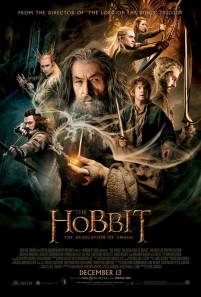
THE HOBBIT: THE DESOLATION OF SMAUG
New Zealand, 2013, 161 minutes, Colour
Ian Mc Kellen, Martin Freeman, Richard Armitage, Luke Evans, Evangeline Lilly, Orlando Bloom, Benedict Cumberbatch, Kate Blanchett, James Nesbittt, Ken Stott.
Directed by Peter Jackson.
We are now in the middle of the story, a year since we were invited to enter the world of the hobbits, pre-Lord of the Rings, and it will be another year until we reach the grand finale and the final credits. In the meantime, we have this sequel-prequel, sometimes an uneasy middle film in a series of three. However, this part of the story is far more straightforward, less unnecessarily complicated than the first in the trilogy. We have become used to the characters, especially the dwarves with Bilbo tagging along to help them on their quest to regain their kingdom.
This is a story of the dwarves, encouraged by Gandalf to go on a quest to reclaim their kingdom, taken over by a monstrous, but very articulate and rhetorical Dragon, Smaug. As they go on their adventures, continually pursued by villainous and deadly Orcs, Bilbo has been seconded again to the group to infiltrate the Treasury and find the jewel that will lead to success.
Ian Mc Kellan as Gandalf is always welcome in these films. But he tends to disappear for long times, going on his own quest, finding an ally who will enable him to enter the dark caves to confront Smaug. The dwarves have a detour on the way, going into the kingdom of the elves, a dialogue with the King, meet Tauriel (Evangeline Lilly) and Legolas (Orlando Bloom again), who are willing to help the dwarves and who slaughter a great number of Orcs along the way. So, plenty of action adventure for those who like this kind of thing.
The dwarves come into their own in this film, a rowdy bunch in the first film causing mayhem in Bilbo’s home. This time they are more differentiated in character for the audience to appreciate many of them but, especially their leader, Thorin, with Richard Armitage coming into his own as the core of the film rather than Bilbo (Martin Freeman ever reliable). Not the Bilbo doesn’t have plenty of things to do, especially at the end, though it is difficult to understand why he didn’t actually keep the jewel when confronted by Smaug.
Another detour on the way to the kingdom is a visit to Laketown, helped by a trader, Bard (Luke Evans) and his family. He is something of a revolutionary in Laketown, a target of the Lord of and his sinister accomplice. This is one difficulty in the film. The Lord is played by Stephen Fry, looking like Stephen Fry, sounding like Stephen Fry, and making the audience focus on Stephen Fry rather than his character. Nevertheless, there are plenty of adventures in Laketown.
In fact, there are several entertaining adventure sequences, especially when the dwarves escape from the kingdom of the elves in barrels and find themselves not only falling into the water but being carried down river until rescued by Bard.
But the climax of this film is having the dwarves outside the caves, then finding the key (Bilbo does that), getting in, but relying on Bilbo to confront Smaug. As noted, Smaug is a highly articulate Dragon, not lost for a word, speaking in a very cultivated accent – and all this courtesy of Benedict Cumberbatch. He has a great deal of aggressive dialogue with Bilbo while breathing out great gusts of fire. (A pleasure for film buffs is that Cumberbatch and Martin Freeman worked together in the telemovie sereis, Sherlock, Cumberbatch as Sherlock Holmes and Martin Freeman as Dr Watson.)
This tends to be a very masculine piece of storytelling except for the very vigorous warrior, Tauriel, no slouch in her role of protecting the towards.
This episode finishes with a question in the form of a deadly exclamation, indicating that Smaug is on the rampage, that Laketown is under threat, and the dwarves regaining their kingdom seems less likely… Audiences now have a year’s anticipation!
1. The story of Middle Earth, the quest of the dwarves? Gandalf, Bilbo, Thorin? The obstacles? The pursuit of the Orcs? A new mission, enemies, the elves, Laketown, Smaug?
2. A middle story in the trilogy? Less complex? Audiences following it more easily than the first film? Identifying the characters? Response to Bilbo, Gandalf, Thorin? The journey and quest?
3. Middle Earth, the villagers, the Indians, forests and mountains, the kingdom of the elves, the Lake and Lake town, the desolation of Smaug?
4. The special effects, the action, fantasy? The musical school?
5. The dwarves, as a group, the particular characters, Thorin as leader, his father, nephew, the injured dwarf, the Irish-accented dwarf? Thorin as leader, meeting Gandalf in the inn, Gandalf’s proposal, Thorin believing him? The journey and the pursuit by the Orcs? Coming to the kingdom of the elves, caution, in the cells, Tauriel and her attraction to the injured dwarf? her help, the escape in the barrels, in the river and the falls? The encounter with Bard, his supporting them, taking them to the town, the barge, the barrels, hiding, covered in fish? The Lord of Laketown and his assistant? The escape from the town, going to the mountain, Bilbo and the search for the key, the last light, of the moon and Bilbo finding the key, entering, the difficulties, the confrontation with Smaug?
6. Gandalf, grey, giant, himself, talking to Thorin, the proposal, his trek, meeting his ally, entering the cave, his wizardry? His role for the future?
7. Bilbo, with the group of dwarves, relying on his help, sharing the dangers, going to the cave, is mission to search for the jewel, finding it, being quiet for Smaug, Smaug awakening, the pursuit, the conversation, the rhetoric, the fight, the dragon fire? Bilbo and his looking at Laketown and his final exclamation in question?
8. The Orcs, ugly, deadly? Legolas and Tauriel fighting them?
9. King of the elves, his audience, with Legolas, Tauriel, assisting them on their way?
10. The Lord of Laketown, Stephen Fry, the response to Stephen Fry as a performer? His fear of revolt, his speeches to the people, wary, the insinuations of his assistant? His suspicions of Bard and imprisoning him?
11. Bard, meeting the dwarves, his help, the barge, the trusting him, the difficulties, his family, his place in the town, revolution, the confrontation with the Lord?
12. Smaug, in the cave, the confrontation with Bilbo, awakening, his power, size, breathing fire, pursuit of Bilbo, their arguments, the pursuit of Thorin and the dwarves? The fight and the escape? The spectacle of the dragon, fire, the cave? Smaug going to Laketown?
13. The audience and the middle story in the trilogy, sense of anticipation?
Published in Movie Reviews
Published in
Movie Reviews
Tagged under
Saturday, 18 September 2021 19:48
Saint in Palm Springs, The
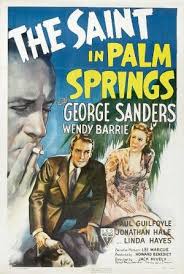
THE SAINT IN PALM SPRINGS
US, 1941, 66 minutes, Black and white.
George Sanders, Wendy Barry, Paul Guilfoyle, Linda Hayes, Jonathan Hale.
Directed by Jack Hively.
The Saint in Palm Springs is the sixth in the popular Saint series, films that were brief, low-budget, used as supporting features. They were based on short stories by Leslie Charteris, the novelist who wrote the Saint series. This was to be the last film for George Sanders as the Saint.
In fact, the main reason for seeing this film is the presence and performance by George Sanders, eternally calm, very well-spoken, with a touch of flirtation, handy at times with the fists, but all times the gentleman.
He is helping out his old friend, Fermack, whose World War I friend is trying to get valuable stamps to his niece in Palm springs. He stages and arrest at the pier when Templar arrives from England. But he eludes the police and goes immediately to Fermack’s office. Fermack is shrewd in motivating Templar to take the stamps to Palm Springs. On the way he meets a pleasant woman played by Linda Hayes – ultimately one of the thieves, a femme fatale who is murdered.
In Palm Springs he meets the niece, played by Wendy Barry who appeared in other Saint films, and enjoys himself at tennis and horseriding. However, a policeman is killed and the Saint goes into action – with some humorous help from his old contact, ex-com, pearly gates, played engagingly by Paul Guilfoyle. The gang makes itself known, Templar organises the situation so that they are all arrested, and all is well. From now on Hugh Sinclair would take George Sander’s place.
Published in Movie Reviews
Published in
Movie Reviews
Tagged under
Saturday, 18 September 2021 19:48
Saving Mr Banks
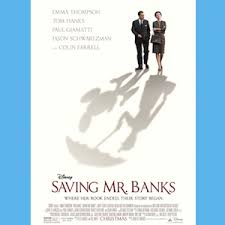
SAVING MR. BANKS
US, 2013, 125 minutes, Colour.
Emma Thompson, Tom Hanks, Colin Farrell, Annie Rose Buckley, Kathy Baker, Paul Giamatti, Jason Schwartzman, Bradley Whitford, Rachel Griffiths, Ruth Wilson, B.J. Novak, .
Directed by John Lee Hancock.
Everyone probably has a view on Mary Poppins, how much they like were – for, perhaps, have some reservations. A personal response: when I saw Mary problems in 1965, I felt somewhat bad for having some caution about this most famous nanny. She seemed far too severe in her manner and in her speeches. so, while I enjoyed the film, Mary Poppins was not a heroine for me in the same way as Maria von trap in The Sound of Music really was! And then came in Jungian psychology could Julian with a perspective on the criteria one used for making decisions, whether they were clear, logical and objective or whether they were more personalised. Mary Poppins was certainly clear logical and objective, not exactly my cup of tea.
Back to the review of Saving Mr.Banks. so, being a bit wary of Mary Poppins, I wondered whether I would enjoy this film. I definitely did and would heartily recommended to most audiences, especially the older audiences who remember seeing Mary Poppins half a century ago and to those who’ve seen the film and watched it on television in the succeeding decades. it brings Mary Poppins to life in the persona of her creator, P.L.Travers.
This is a film about the making of Mary Poppins. Walt Disney had been asking the.L.Travers for the rights to make the film since the 1940s when his daughters read and enjoyed the stories. she had resisted but, in the early 1960s, running short of funds, she was persuaded to go to Hollywood, make Disney and discuss the screenplay for the film. She had many reservations, certainly did not want any animation, was wary of it being a musical, and she didn’t want Dick Van Dyke. In fact, when she went to the meetings with the screenwriter and the Sherman brothers who are composing the songs, she stipulated that all the meeting should be tape-recorded.
It is wonderful to see Emma Thompson as P.L.Travers. She was a difficult personality, not immediately blessed with personal communication skills. We see this in her dealings with her agent, on the plane with the flight attendant, with all the staff at the Disney officers, even with Walt Disney himself. She disliked a lot of the screenplay, took umbrage at some of the songs, especially when the Sherman Brothers invented the word responsibility which she urged him to make. And there is a humorous moment when the brothers conceal the music page which starts super…
And Disney himself is played by Tom Hanks, bringing dignity to the role as well as an affable approach to his difficult author. There are many scenes in the Disney officers, interesting and entertaining, but very helpful in terms of dialogue, descriptions of characters, especially Mr Banks and his must –, and the composing of the songs. Mrs Travers also has a visit, with Disney himself, to Disneyland.
There is a very good supporting cast including Paul Giamatti as her Los Angeles chauffeur, Bradley Whitford as the screenwriter, Jason Schwartzman and be.J.godly as the Sherman brothers.
But, this is only half the film. In fact, it opens in Maryborough, Queensland, in 1906, with the author herself as a little girl whose nickname from her father was Ginty. The family was poor, the father working in a bank, but having a drinking problem. he was devoted to his daughter, sharing her love of stories and poems. Later, the family is transferred to south-western Queensland where her father works in the bank, almost getting fired because of his drinking.
The sequences of Queensland are intercut all the way through the film with the scenes in Hollywood. What happens is that the adult Mrs Travers is understood through her childhood and her relationship with her father, and Mary Poppins is understood from the childhood, especially with the aunt (Rachel Griffiths) who looks and sounds like Mary Poppins when she comes to look after the family during the father’s illness. It is quite surprising to find Colin Lehiff playing the father, strongly and sympathetically, despite his drinking and his failings.
There is plenty to interest and enjoy in this behind-the-scenes story of the difficulties and joys in making Mary Poppins classic movie.
1. An entertaining film? Critical acclaim?
2. Mary Poppins, the audience for this film, 50 years after the release of the film? Older audiences, younger audiences who have seen the film on television? Its appeal?
3. Background, Hollywood and the making of films, the Disney Studios, the processes and difficulties? The writers, the producer, the crew?
4. The popularity of Mary Poppins, the books, widely read? The film, Oscar for Julie Andrews, for the Sherman Bros score? The strong cast? The music, the animation?
5. The structure for this film: Queensland, 1906, the transition to London in the early 1960s, the transition to Hollywood? The intercutting of these stories? The effect as each commented on the other? The novels and the screenplay for offering a child’s understanding of her father, through the memories evoked? The film offering an understanding of P.L.Travers through her past and her life?
6. The introduction to Ginty, her age, place in the family, relationship with her mother, the mother and the baby, her bond with her father? Maryborough and the bank, the house, his being fired, his drinking, walking through the town to the station, moving, his optimism, his imagination and games with Gintyy, the horse ride, going to the end of the line? The new house, the isolation, the chickens? The town and the bank?
7. Ginty, her life at home, the stories, writing poems, sharing them with her father, her busy mother, seeing her father drinking, seeing him at the bank, his not being fired because of her, going to the fair, his speech about the awards, his drinking, his collapse? Tending her father at home, his illness, the doctor, taking him the drink, her mother and her walking into the river to drown herself? Her rescuing her mother?
8. Ginty’s aunt, her arrival, the silhouette, Mary Poppins, her words, look, in action, Ginty disappointed with her for not saving her father?
9. The father, his life and work, his drinking, loving his wife and family, loving Ginty, disappointed in himself? His death? Ginty watching him dead? The realisation for Walt Disney that it was Mr Banks and Ginty’s father who needed rescuing? His daughter’s devotion to him, even taking his name as her married name?
10. London, the agent, her insistence on being called Mrs Travers, her madi and her abruptness, Disney and his 20 years requests to make the film, her lack of income, the contract, deciding to go to Hollywood?
11. Emma Thompson and her performance, very British (though later named as an Aussie)? The language, proper, not wanting to be touched, brittle, caustic and correcting people?
12. Going to the United States, carrying her own bag, the clash with the flight attendant and the later re-meeting? Wanting to crash? Perfectly capable of doing everything for herself?
13. Her chauffeur, his character, pleasant, commenting on Los Angeles and her disdain of California? The scenery? Sun and rain, Ralph and his giving his name to Pamela? Telling her the story about Jane and how she read Mary Poppins, disabled, the importance of sun and rain for going outside not, her signing his book? Her only American friend? Meeting her on her return for the premiere, reassuring her as she went up the red carpet?
14. The Disney offices, Tommy, the other assistant, their personalised communication, her disdain – especially for the mountains of food that were brought in and she dismissed?
15. Going to the hotel, Mickey Mouse and all the toys in her room, cups of tea, going to the bar and having a pot of tea, the very English presuppositions?
16. The screenwriter and the Sherman Bros, the initial meeting, names, her haughtiness as she arrived at the studios, demanding to see Disney, going to the meetings, reading out the script, her demands that everything be tape recorded? Correcting the writer and the musicians? The word responsabilt, and her telling them to unmake it, the joke about supercalifragilisticexpialidocious? The discussions, the costumes, the criticism of the house and it being too upmarket? Mr Banks and moustache? The range of songs and seeing them composed: spoonful of sugar, feed the birds, fly a kite? Her demand that there be no animation? No Dick Van Dyke?
17. Indicating the family stories, and the mutual illumination of each story as it progressed?
18. Walt Disney, Tom Hanks, the familiarity, calling him Walt, she calling him Mr Disney? Reminiscing about the 20 years, his promise to his daughters to make the film, the ideas, the characters? His talk about Mary Poppins and her origins? The staff genial towards her yet her haughtiness? Her being persuaded to go to Disneyland, Disney and his talking about Disneyland, the autographs, on the merry-go-round and his winning the bet? Talks with her, reactions, his hanging up on her?
19. The shaping of the film, Disney and the nature of stories, discussions with Pamela, interchange of names, his pleasantness, failing? Mary Poppins to save the children, and his later realising that she was there to save Mr Banks, Pamela wanting to save her father? Pamela’s interchange with the writer and the Shermans, listening to the song of flying the kite, her joining in?
20. Her demands to have no animation, walking out, not signing the contract, having tea with her agent, the issue of the premiere, her decision to go?
21. Disney going to London, to her front door, their discussions, his explanation of his own father, the psychological issues of fathers? Love, admiration, failing them?
22. To Los Angeles again, Ralph there to meet her, going to the office demanding the arrangements, the staff and the reaction, her presence at the premiere, the nature of the premiere, the crowds, the Hollywood hoopla?
23. In the cinema, watching the film, her disgust at the animation, the penhuins, the realisations about her father, her weeping?
24. The resolution of the issues, the making of the film, signing the contract, her response?
25. The final credits, the photos of P.L. Travers with Disney and Julie Andrews, the photos with the crew? and the humour of replaying some of the tapes with her own voice from the 1960s?
Published in Movie Reviews
Published in
Movie Reviews
Tagged under